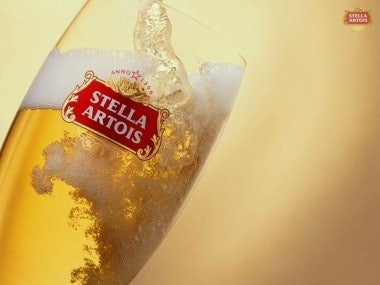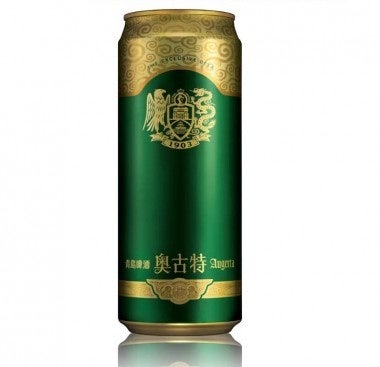Stella Artois Recently "Re-Launched" In China, With Lower Alcohol Content#

The world's largest consumer of beer for nearly a decade, China's thirst for beer -- mostly German-style light lagers from homegrown breweries like Tsingtao, Snow, Zhujiang and others -- has been well documented. But with living standards rising, and more international brewers eying the country's growing middle class, Chinese beer drinkers have become spoiled for choice, with brands like Carlsberg and Heineken becoming ubiquitous nationwide and a growing number of premium beers -- both foreign and domestic -- hitting bars and store shelves. Still, the massive output of domestic Chinese breweries like Tsingtao means that regular price wars create a race to the bottom, in terms of pricing and profitability. This means that, for major domestic Chinese macro-brewers, the profit margin of a bottle of beer is often less than that of a bottle of pure water. As Jing Daily noted last year, with their trademark low-range lines, Chinese brewers only see an average of 100 yuan (US$15) profit from one ton of beer.
Unsurprisingly, this market reality has pushed Chinese brewers to introduce higher-priced, higher-quality premium lines like Augerta and Yipin Pure by Tsingtao, and Zhujiang's Supra White. However, they're fighting tough odds against powerful foreign imported premium brands, which currently make up about 70 percent of the premium beer market in China and are looking to control even more. Recently, Bloomberg noted that Heineken and its partner Asia Pacific Breweries Ltd. are planning to further boost profitability in the China market by focusing on the premium segment, which Heineken observes sells for about four times more than regular lines there.
Via Bloomberg:
Consumption of premium beer in China is estimated by Asia Pacific Breweries to grow 12 percent annually through 2020 to 2.1 billion liters, Asia Pacific Breweries said yesterday.
“Focusing on the premium side of the market is the approach foreign brands should take,” said Olive Xia, an analyst at Core Pacific-Yamaichi International Ltd. in Shanghai, who has a “buy” rating on Tsingtao. Local brands dominate the non-premium market, she said.
While it makes sense for major international brewers, and even domestics, to focus on the far more profitable premium market, we can't help but wonder if they're doing it all wrong in China by sticking to higher-priced varieties of the same old beer styles. As with the wine market, Chinese tastes are changing and diversifying. Whereas Chinese wine drinkers were until recently more or less content with mid-range domestic wines by the likes of Great Wall, tastes have rapidly shifted to French Bordeaux and (increasingly) Burgundy at the highest end, and to New World wines from Australia, the US and Chile among the middle class. Yet major brewers continue to ply an array of "premium," "high-end" light lagers, nearly indistinguishable from one another, in the China market.
A good example of a puzzling move by a major brewer is Stella Artois' recent "re-launch" in the China market. Late last month, at a somewhat lavish event in Beijing, Stella, which has been available in China for quite some time, "officially launched" in China, only the beer is priced the same as the "pre-launch" version yet has a lower alcohol content. As That's Shanghai wrote of the move:
Confused? So were we. But apparently, this is what Stella means when it says it's "launched Stella Artois beer in China" - They're now selling beer to the Chinese for the same price...but at 4% alcohol level (as opposed to the 5% the rest of the world gets). They say it suits the Chinese better....the Chinese who guzzle whiskey, baijiu and red wine like it's their job. I mean,
in Shanghai drinkers are moving towards dark, European-style bitter beers. They are definitely indicating that they want a lighter, less alcoholic, more watery beer. Totally. Good job marketing department. You get a gold star.
Anyway, so when you buy Stella Artois at places like Sasha's, Brownstone and the Puli Hotel, just remember - as you take your first cold, frothy sip - you're getting less bang for your buck. That's what we got from this whole encounter.

With Chinese drinkers diversifying in every possible segment, moving from baijiu to vodka and scotch, cheap blended domestic plonk to Sauternes and DRC, it only follows that they'd tire of light lagers in the German mold. In first-tier Chinese cities, the changing tastes of Chinese beer drinkers are obvious. In Shanghai, Belgian-inspired beer bars like Kaiba are making fans of locals, and popular Chinese restaurants like Di Shui Dong are starting to carry a range of American and European craft beers alongside Budweiser and Tsingtao. The microbrewing scene in China is also starting to heat up, with the
Boxing Cat Brewery#
in Shanghai and Beijing's
Great Leap Brewing#
and
Slow Boat Brewery#
catering to lovers of hand-crafted beer.
With this in mind, we asked Michael Jordan, brewmaster of the Boxing Cat Brewery, about recent moves by international brands like Stella Artois in China. With eight beers currently on tap in its two locations in Shanghai -- three lagers and five ales -- the Boxing Cat is known for bolder American-style craft brews, which Jordan says have found a very receptive audience among Shanghai locals and expats alike. Said Jordan,
I find the Stella Artois decision to be really strange. The product has already been on sale in China for a while and it's often on tap at nice establishments; usually for a higher price. (Around 70rmb for a half liter). It's also my understanding that ABI has really been pushing Stella Artois as their premium beer in their portfolio and they have been doing this around the globe for the last couple of years. I consider it to be a "premium beer" so the decision to "dumb" down the beer with lower alcohol and less flavor strikes me as backwards progress for the better beer movement.
I would think it would be more beneficial to create a whole new brand for the Chinese market instead of compromising the image of Stella Artois.
I doubt they will reduce the price of Stella either, so I guess the profit margin for them on this beer will greatly increase. Maybe I am missing something...Do they think Chinese drinkers will gan bei the lower alcohol Stella Artois? It's cool to buy an expensive beer and throw it down the hatch?
I personally think it's a bad decision, as Chinese customers have been exposed to foreign brands for a while, especially Belgian beers.
These beers, of course, are typically more flavorful and often contain much higher alcohol content. I think the Stella Artois decision is the reverse trend of what is happening with better beer and people understanding beer. I also think it's interesting timing, since ABI is opening their own establishments in China, Belgian Beer Cafe. That seems like the perfect platform to expose customers to their brands and the historical aspect of the brands.
Why water down a beer that has been brewed for 650 years?
I guess I am puzzled...but I know I will never buy a Stella Artois in China!
As Carl Setzer, the American co-founder and brewmaster of Beijing's
Great Leap Brewing#
, adds on consumer trends he's seeing in the Chinese capital:
I think that the effect that Great Leap Brewing has had, in Beijing at least, is that our Chinese customer set is an 'educatable' and 'maturable' market, meaning the minority segment of craft beer drinkers that are potentially present in any market is also present here. When we first opened 14 months ago our Chinese customers were mainly just tag-along friends with groups of foreigners or the occasional Chinese business traveler who has experience abroad in other cultures that had craft brewing markets. The reaction was usually similar, those that had tried craft ales before were appreciative and those that were trying it for the first time were skeptical and often angry that I would insult their intelligence by trying to pass my darker, fuller in flavor "bitter malt juice" as a real "beer".
The second reaction would often lead to a one glass and gone situation. But then the interesting part was when that same skeptical Chinese customer would come back about a week later, alone. He would sit at the bar and order one of every beer on the menu (at the time we had 5-8 at any given time, now we have 12, so this method wouldn't work for the new beer drinker these days) and he or she would sit silently and drink each beer, pay their tab and leave. Then they would come back the next week, angry.
I would get an earful about how they have to sit through business dinners all week and drink domestic lagers and they didn't find any pleasure in them anymore because they didn't have the heart that our beers had
. It would take about 3-4 angry visits before these customers would bring their own friends, but eventually our customer base shifted from overwhelmingly foreign to a 60/40 split between expats and Chinese. The new customers were enthusiastic and genuinely interested in what we were doing because it was something they could be proud of, it was a Beijing original.
After our Chinese customers went from being reluctant to being regulars we felt comfortable bending their ear about why they liked our beers vs. popular imported craft and European styles and the answer we got was a pleasant surprise: Great Leap Brewing isn't trying to copy a foreign style, its trying to make a Chinese craft beer
. They felt that our beers were truly localized because we weren't trying to make an American IPA or a purely British/Irish dark. We were using local ingredients common and popular in Chinese cooking, culture and medicine to make our beers familiar and interesting to a skeptical Chinese market, we were using 100% local Chinese hops and 95% locally malted barley and wheat. Our Chinese customers didn't have to feel stupid, they could look at our menu and see Chinese language explanations of our ingredients and names for the beers that were derived first in Chinese and then interpreted into English. They could find a style or flavor that they liked and start there without having to ask or rely on a foreigner to "teach them".
Based on this experience
I think that the approach to "localize" foreign brands to the Chinese market by gutting them and making them light and heartless is insulting to the growing Chinese craft beer drinking market
, but at the same time its great for Great Leap Brewing, because it sets us apart from large industrial breweries who underestimate the potential of the market here. So as a consumer I think its horrible, but as a major contributor to the market I couldn't be happier.
